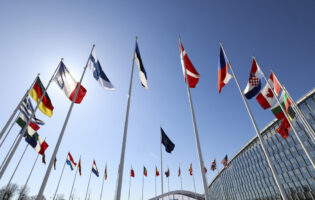Trump, Merkel, and Putin: Lessons and Legacies for Transatlantic Cooperation toward Russia
Under the presidency of Donald J. Trump, transatlantic relations deteriorated significantly. Many analysts argued that this is particularly the case for a core issue – German-American security cooperation toward Russia. A mutual approach by President Obama and Chancellor Merkel had been instrumental in organizing an effective transatlantic response after Russia’s aggression against Ukraine in 2014. Signs abound for the subsequent weakening of this German-American cooperation: President Trump’s public derision of Angela Merkel, his apparent dislike of NATO and the EU, his frequent praise for Vladimir V. Putin, and his oft-stated goal to “get along with Russia” despite its numerous infractions. But has German-American security cooperation toward Russia weakened under President Trump? And if so, to what extent is this due to his idiosyncratic personality and worldview, rather than to structural forces? Looking forward to a new Biden presidency, reliable answers to these questions give important clues for the future of transatlantic security cooperation.
Event Summary:
Historically, transatlantic relations largely developed in reaction to the Soviet Union and later Russia. Germany and the United States have cooperated particularly extensively since Russia started to use hybrid and overt measures against Ukraine in 2014. As transatlantic leaders develop their Russia policy, the research asks how leaders, their personalities, and policies, affect existing bureaucratic, structural policy directions.
The research addresses three main questions:
- How has German-American cooperation developed under President Trump?
- Are changes in cooperation due to Trump’s particular worldview and leadership style? Or are other factors at play?
- What lessons can future U.S. policymakers learn as they work on policy toward Germany and Russia?
The presentation examines the changing German-American cooperation towards Russia through four examples: Diplomacy and public rhetoric, NATO and the nuclear umbrella, sanctions, and Ukraine.
Diplomacy
- The overall rhetoric of President Trump toward Germany and the EU was negative. Trump consistently disparaged Chancellor Angela Merkel’s policies and leadership and at one point labeled the EU as a “foe.”
- President Trump left the ambassadorships to the EU and Germany vacant for over a year. The ambassadors he did appoint were known for being antagonistic toward the local governments and populations.
- President Trump has been silent on Vladimir Putin and Russia’s behavior in the world, even saying he believed President Putin’s word about Russian interference in elections.
- These bilateral diplomatic touchpoints had impacts on multilateral fora. After Russia was expelled from the G8, Angela Merkel resisted calls from German business interests to re-admit Russia. On the other hand, President Trump pushed to include Russia in the 2018 G7 forum.
NATO, Troops, and Nukes
- President Trump frequently cast doubt on the U.S. commitments to collective defense. He connected the issue of U.S. commitment to Article 5 to European defense spending, referring to nonexistent unpaid NATO “fees.”
- When the EU initiated the European Defense Fund to increase their own investment in defense capabilities, the Trump administration admonished against protectionism, which made allies wonder if the push for increased defense spending was actually about effective deterrence against Russia or U.S. defense manufacturers’ access to European markets.
- Under the Obama administration, there was criticism of Russian behavior under the Intermediate-Range Nuclear Forces (INF) Treaty, but allies preferred it to remain in place so that there were at least some arms control measures in place. The Trump administration withdrew from the INF Treaty without consulting allies, without an alternative plan for strategic security.
Sanctions
- In 2014, the United States and Germany were at the forefront of creating a unified response to Russia’s invasion of Ukraine.
- Sanctions intensify during the Trump administration; however, the impetus comes from Congress rather than the president. CAATSA, the Congressional sanctions package put together with overwhelming bipartisan support, took into account U.S. energy interests, but not those of European allies.
- S. withdrawal from the Iran Nuclear Deal had repercussions on German businesses. German and French leaders actually went to Russia to try to salvage the deal after the U.S. withdrawal.
Ukraine
- President Obama decided not to provide lethal aid to Ukraine after consultation with European allies; President Trump reversed this policy because advisors thought it would benefit U.S. defense companies.
- In the now-infamous phone call between President Trump and Ukrainian President Zelensky, President Trump tried to leverage U.S. weapons support for information on political rivals. In the same call, President Trump disparaged European allies.
Across these four categories, transatlantic cooperation toward Russia has deteriorated from the Obama administration to the Trump administration. While some transatlantic issues will go away with Trump administration (unilateral action, unpredictable policy), some issues remain. Indeed, transatlantic disagreements on the INF Treaty, Nordstream 2, and defense spending preceded and will outlast President Trump. The German public is less and less supportive of the traditional postwar security alliance.
Lessons
- Coercing (big) allies rarely pays off – the pressure campaign by Trump administration led to lowered defense spending in Germany.
- Avoid negative side effects to allies – Nordstream 2 is still happening even with U.S. sanctions.
- Unilateral actions deteriorate cooperation and trust long term
- Appreciate the merits of German/European ownership of Russia policy
Discussion:
What are the most important issues the Biden administration should address when it comes to transatlantic Russia policy?
- Nuclear: Prolonging New START is politically possible and would signal to Moscow, Berlin, and Brussels that progress can be made on nuclear issues.
- Climate policy: If you can make progress in one area it can spill over to others, the Biden administration should take advantage of initial favorable expectations in Europe.
How much continuity will there be in Germany on Russia policy after Merkel is no longer chancellor?
- Chancellor Merkel has been instrumental in German Russia policy. But because at least one of the central parties is likely to remain in the governing coalition, there is a great deal of continuity in German policy even with a change in chancellors or coalitions.
What can Germany proactively do to prove relations with the United States? What direction does Germany hope transatlantic relations will take?
- Germany has effectively remained resolute and used its power within Europe to drive policy toward Ukraine. Multilateralism and coalition building are German expertise. Germany can push for modest, incremental policy changes.
What role does China have to play in transatlantic Russia policy?
- There are two themes in Russia/China relations. One is the issue of “state sovereignty,” or the need to work together to protect their autocratic regimes from the democratizing side effects of liberal globalization. The other narrative is the tension between Chinese economic and territorial ambitions and its Russian neighbor.
- The United States and EU have many shared interests when it comes to China policy. However, Germany is more likely to react strongly when a there is a clear threat perception, which there was when Russia invaded Ukraine. Germany does not sense a strong security threat from China.
- Russia needs to modernize its economy, and the most likely partner in that is the European Union, not China.
Supported by the DAAD with funds from the Federal Foreign Office (FF)






